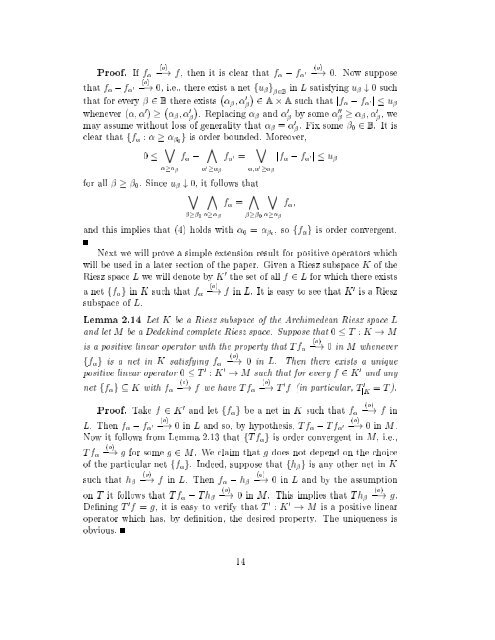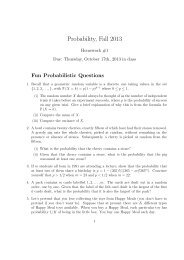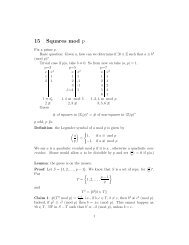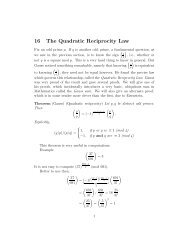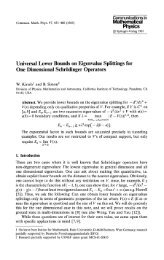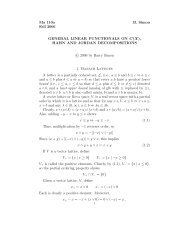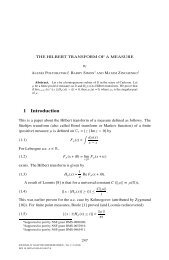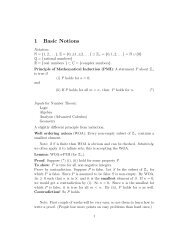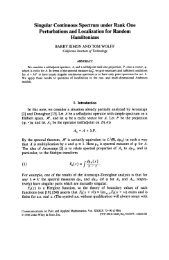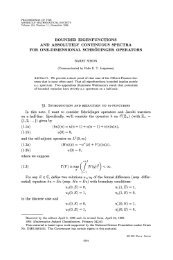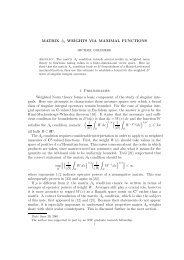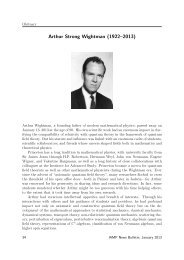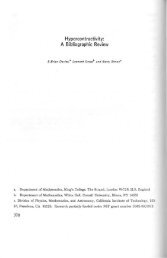Representations of positive projections 1 Introduction - Mathematics ...
Representations of positive projections 1 Introduction - Mathematics ...
Representations of positive projections 1 Introduction - Mathematics ...
You also want an ePaper? Increase the reach of your titles
YUMPU automatically turns print PDFs into web optimized ePapers that Google loves.
Pro<strong>of</strong>. If f<br />
(o)<br />
(o)<br />
;! f, then it is clear that f ; f 0<br />
(o)<br />
;! 0. Now suppose<br />
that f ; f 0 ;! 0, i.e., there exist a net fu g in L satisfying u # 0such<br />
2B<br />
that for every 2 B there exists ; 0 2 A A such that jf ; f 0j u<br />
; 0 0 whenever ( ) . Replacing and 0 00 0 by some , we<br />
may assume without loss <strong>of</strong> generality that = 0 . Fix some 0 2 B . It is<br />
clear that ff :<br />
0<br />
0g is order bounded. Moreover,<br />
_ f ; ^<br />
f 0 = _<br />
jf ; f 0j u<br />
for all 0. Since u # 0, it follows that<br />
_<br />
0<br />
0<br />
0<br />
^ f = ^<br />
0<br />
_ f ,<br />
and this implies that (4) holds with 0 = 0, so ff g is order convergent.<br />
Next we will prove a simple extension result for <strong>positive</strong> operators which<br />
will be used in a later section <strong>of</strong> the paper. Given a Riesz subspace K <strong>of</strong> the<br />
Riesz space L we will denote by K0 the set <strong>of</strong> all f 2 L for which there exists<br />
(o)<br />
anetff g in K such that f ;! f in L. It is easy to see that K0 is a Riesz<br />
subspace <strong>of</strong> L.<br />
Lemma 2.14 Let K be a Riesz subspace <strong>of</strong> the Archimedean Riesz space L<br />
and let M be aDedekind complete Riesz space. Suppose that 0 T : K ! M<br />
is a <strong>positive</strong> linear operator with the property that Tf<br />
(o)<br />
;! 0 in M whenever<br />
ff g is a net in K satisfying f<br />
(o)<br />
;! 0 in L. Then there exists a unique<br />
<strong>positive</strong> linear operator 0 T 0 : K 0 ! M such that for every f 2 K 0 and any<br />
net ff g K with f<br />
(o)<br />
;! f we have Tf<br />
(o)<br />
;! T 0f (in particular, T 0<br />
jK = T ).<br />
Pro<strong>of</strong>. Take f 2 K 0 and let ff g be a net in K such that f<br />
(o)<br />
;! f in<br />
L. Then f ; f 0<br />
(o)<br />
;! 0inL and so, by hypothesis, Tf ; Tf 0<br />
(o)<br />
;! 0inM.<br />
Now it follows from Lemma 2.13 that fTf g is order convergent in M, i.e.,<br />
(o)<br />
Tf ;! g for some g 2 M. We claim that g does not depend on the choice<br />
<strong>of</strong> the particular net ff g. Indeed, suppose that fh g is any other net in K<br />
such that h<br />
(o)<br />
;! f in L. Then f ; h<br />
on T it follows that Tf ; Th<br />
(o)<br />
(o)<br />
;! 0 in L and by the assumption<br />
;! 0 in M. This implies that Th<br />
(o)<br />
;! g.<br />
De ning T 0 f = g, it is easy to verify that T 0 : K 0 ! M is a <strong>positive</strong> linear<br />
operator which has, by de nition, the desired property. The uniqueness is<br />
obvious.<br />
14


